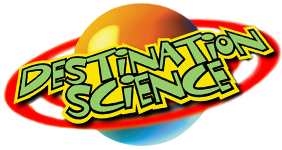Destination Science has operated with two essential principles since day one:
1. Develop confidence and enthusiasm about science as kids gain knowledge about how the world works around them.
2. Build character and skills for life – including curiosity, creativity, critical thinking, cooperation, persistence and more!
Let’s take a look at exactly how we accomplish these two goals and why it is so important for each kid to leave our camp feeling confident, enthusiastic, and more skilled than when they arrived.
Each day of camp is built around teamwork. As we describe in our What Will My Child Do At Camp? page, kids are split into age-appropriate groups of no more than 14, so each child has the space to learn and be involved. During our activities, campers are encouraged to share theories, ask questions, explore possibilities, and let their imagination soar as we journey through our daily themes as a group.
“Destination Science is a chance for kids to really dig into science with fun hands-on experiences that develop confidence and satisfy their curiosities,” Camp Director Kathy Heraghty said. “Our program is developed and run by cool science educators and is focused on action-packed activities that are meant to teach a range of scientific concepts in a way that allows kids of all ages to experience and explore. The camp allows children to have those ‘Aha!’ moments when they realize that science is not just about Bunsen burners and boring formulas.”
Science isn’t just a subject: it’s a way to look at life. Learning about science should do more than just help you pass tests and answers questions correctly, it should make you curious as to know the why! That level of curiosity is important to maturing campers in an always-changing world. When we teach campers how superpowers and robot dinosaurs work, we want them to take that knowledge and apply it the amazing things around them everyday.
“We are confident that the kids who attend our program will go on to invent great things that change the world and build science confidence,” said Heraghty
Being hands-on with various types of science is also key to growing your imagination. We connect daily projects and activities with real-world applications. For example, when a camper’s superhero supercar is finished, they understand how real cars work. When camp comes to a close, parents repeatedly tell us that their kids have a new sense of pride and confidence when describing the fun things they helped build and create. If a project comes apart at home, they are quick to try and figure it out instead of getting frustrated or throwing it away. This type of persistence and critical thinking is key to both academic and professional success and comes naturally to campers that spent their summers learning and building as a team.



